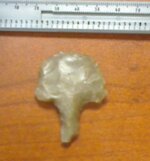mikeofaustin
Bronze Member
A friend of mine goes hunting every now and then around a particular land tract out in the middle of nowhere. Out there one time, and finds what looks like a broken flint knife blade. Didn't think much of it, then on a different day, stumbles upon this one. This is without him even looking, he just happened upon it. I'm starting to think that maybe he found an old indian site. (Sorry for the picture quality)






